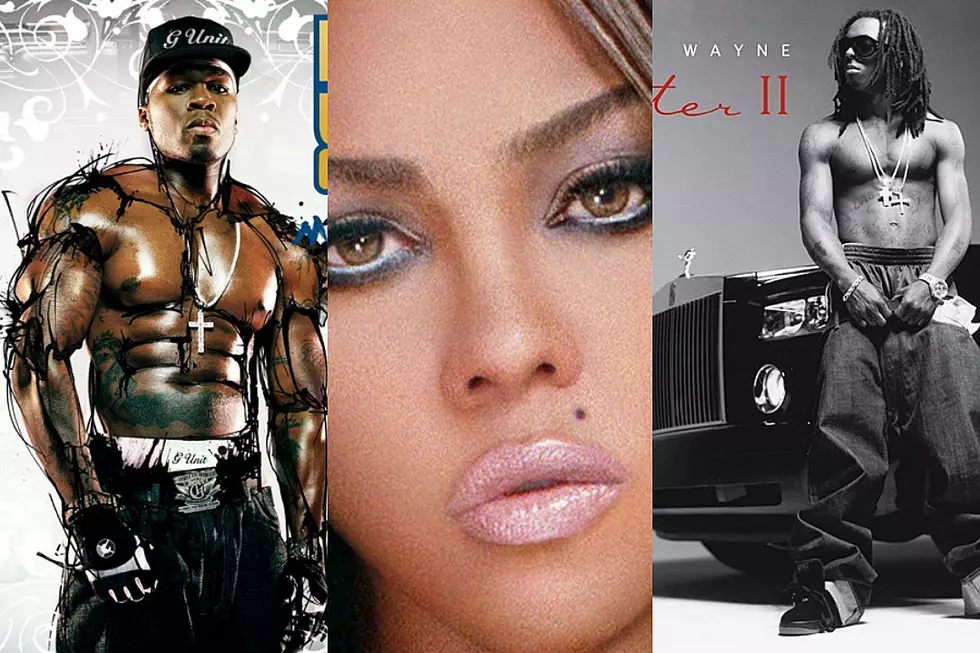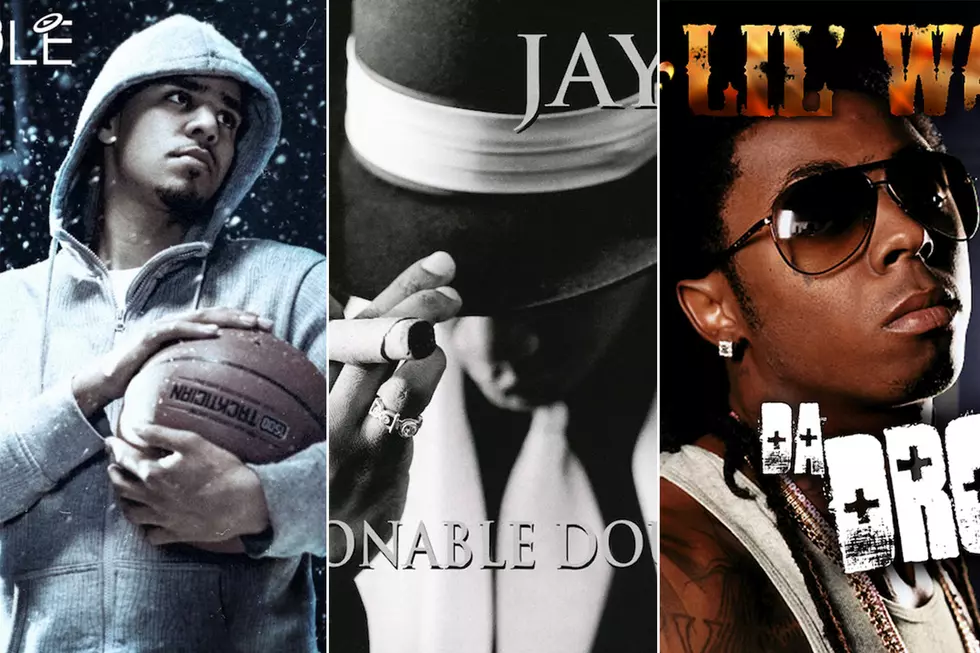Chamillionaire: Success
Forget first week sales—a month after his sophomore album’s release, the Houston MC has a long-term recipe for staying relevant.
 Since his breakthrough, The Sound of Revenge, was released in 2005, Chamillionaire has ridden his bold baritone and left-of-center subject matter to an ironic plateau on hip-hop’s topography. He’s a contradictory mix of all things to all people: Mixtape Messiah, societal sage, mainstream moneymaker. His recent release, Ultimate Victory, represents a pursuit of the simpler things: “I thought about different topics, and everything in society, from why people are poor, to living the good life and taking a vacation, and I tried to completely craft all of those into one meaning at the end, which is really just to enjoy life.” After the album debuted at number 8 on the Billboard chart and sold just over 78,000 copies on the strength of the “Hip-Hop Police” single, he’s far from discouraged. With a new video for another conceptual song, “Industry Groupie,” dropping, Cham knows that true victory comes from playing the long-game, not just focusing on first-week sales.
Since his breakthrough, The Sound of Revenge, was released in 2005, Chamillionaire has ridden his bold baritone and left-of-center subject matter to an ironic plateau on hip-hop’s topography. He’s a contradictory mix of all things to all people: Mixtape Messiah, societal sage, mainstream moneymaker. His recent release, Ultimate Victory, represents a pursuit of the simpler things: “I thought about different topics, and everything in society, from why people are poor, to living the good life and taking a vacation, and I tried to completely craft all of those into one meaning at the end, which is really just to enjoy life.” After the album debuted at number 8 on the Billboard chart and sold just over 78,000 copies on the strength of the “Hip-Hop Police” single, he’s far from discouraged. With a new video for another conceptual song, “Industry Groupie,” dropping, Cham knows that true victory comes from playing the long-game, not just focusing on first-week sales.
Your last album seemed to get a delayed reaction. Did that effect the way you approached Ultimate Victory?
I remember like it was yesterday, when my album came out the first time, what everybody was saying. I honestly feel like I’m back in that position again. I remember opening the XXL and seeing bad reviews and the bad ratings, and media people who didn’t know who I was. It’s back to that square one again. It’s like, every time you make it over that hurdle, people just gotta applaud you. I feel like I’m an underground artist again. That’s basically what that record’s about.
Ultimate Victory has been out for about a month now. How do you feel about the way it’s moved so far?
I mean, of course it could be better. But I’m really not a person that’s completely focused on first week numbers. People now automatically will compare a year’s worth of work that I did to seven days, or 14 days. That’s crazy. Look at all the top artists that you see visually on TV, that’s running hip hop right now. Probably 80, 90% of them ain’t selling no records. Even the people that are visible on everybody’s records. I think it’s just this formula of, ‘You know what man, we gonna do two weeks worth of commercials, and if we don’t get the response we want immediately, we give up.’ It happens with the label, it happens with the artist, and it trickles down even to the fans now. Fans forget about albums that come out two weeks ago. My thing is, I refuse to let them forget. I stay on it. You can’t break me easily. I’m a person that’s kinda hard to convince of a lot of things. And with fans, you gotta give me a good reason why 50 Cent’s numbers ain’t good.
What you’re hinting at there, that disconnect, seems to have affected every aspect of the industry: fans, artists, labels…
Yeah, definitely. Even fans think they’re the biggest A&Rs now. A lot of people think they can take you what a hit is. The mold for a hit has changed so many times. I don’t care who you are in this planet, if I would’ve brought that “Ridin’ Dirty” record to you, you would not have known it woulda done that. No way. People act like it’s a pop record. It’s a street record; it just ended up crossing over to the pop world. So of course, because I’m a pop artist now, and I’m on freakin’ MTV and all these big channels, a person naturally expects me to come back and do a pop record now. We feel like because we cross over to a pop world, we gotta make pop records. And we really don’t. The new formula for a hit has changed, and you can’t really tell what it is. You just make good music and let the people pick. I’ve been victim of a lot of label politics, but I’m not gonna be one of them artists who complains. I hear so many artists that do that; dudes in their Rolls Royce Phantoms complaining that the label ain’t spending no money on them. The only thing I have an issue with is when I try to take stuff into my own hands and people get mad, like, “Chamillionaire thinking he can do everything.” But it’s just that I’m trying to be productive.
You have a lot of socially conscious material on the album. Do you feel its an artist’s responsibility to help the audience understand what's going on?
Some people are built for that, and some people aren’t. Every artist isn’t supposed to be up there teaching some message to these kids because every artist ain’t built to be like that. Every artist ain’t gonna be in a CEO position but some people are built for that. And when it comes to hiding the medicine inside the candy to where people have to ask, ‘What is this about?’ I think I’m built for that. You can put that in big quotations: “I feel like I’m a leader.” I can’t help it, that’s all I know how to do. If you ask me a question I’ma answer it in a real way because that’s just me. So when I make my music and run in that booth, what inspires me to get in there and write is just the fact that I know somebody’s listening and what I want to say. I’m a person who gets in the booth and speaks with a purpose. I don’t even care if you’re a gangsta rapper, a conscious rapper, I don’t be feelin’ it if it’s not somebody speaking with a purpose. I don’t even really remember somebody completely speaking with a purpose every time he spoke since ‘Pac. Nobody. People just make words rhyme just to make ‘em rhyme. With me, I’m like, ‘Man, F it,’ and somebody might call it career suicide, but I beg to differ. I’m just trying to fill a void that I feel rap needs, ‘cause I love rap, and I listen to it as a whole genre. I just know what it’s missing in my opinion. And what I just came with is what I think is missing. People never really see the motive in the beginning with me, and then they always find out later. My life has been like that. And I haven’t even begun yet. Now, I’m not saying I’m fitting to be all socially conscious; I’m gonna jump all over the place. I’ma do something completely different next time I come.
You had a solid fan base from mixtapes before you blew up. Do those older fans seem happy about your success?
Yes and no. There’s a big majority of people who are happy to see me make it, and feel like I’m a good representative of Texas and the underground community, so they’ll root for me to make it even further. People that will be real happy that I won a Grammy. People who will be real happy that I actually broke all these ringtone records because back in the day, there’s so many people that used to be at home, listening to my mixtapes and hoping for me to make it. But we really couldn’t fathom it until I really got there, so now it’s still like a dream come true for them. A lot of people are living the whole experience through my eyes. But then again, you got some people who are like, “Chamillionare, it ain’t the same.” Or “He’s crossing over, he’s commercializing.” And that happens, especially with a record like “Ridin’ Dirty,” which started as a street record. A lot of people loved it in the underground then once it became so commercialized that little kids in the suburbs are singing it, then it came to the point when people are like, “Aw man, I’m tired of that song.” That’s just the natural way of people, and the natural way of hip-hop.
Coming from an underground mentality, you must understand how people can be protective of your music, not wanting it to be perceived as commercial.
Yeah, definitely. I feel the same way for certain things. Look at the whole gold teeth thing, how that got out of control. Or even screwed music, how it just started becoming more commercialized, and everybody started screwin’ all kind of Justin Timberlake albums. Before it was a rawer, underground type of feeling. A lot of people wish I could completely stay that young, raw, hungry cat that was dissin’ major labels. But then considering the fact that I’ve traveled and seen all the world and seen something a lot bigger than the little pot I was aiming for, it makes me understand the whole empire a little bit more, concentrate a little more, and do some things that some people might not understand. But then, as an artist, people always attach themselves with whatever part of my life they remember. If they loved the part when I was selling mixtapes out the trunk, and doing freestyles about bling-bling and diamonds, then they attach themselves to that, and tell themselves now that that’s me. They don’t realize that it’s been an evolution where I’ve grown into the person that I am now.
More From XXL









